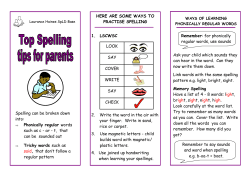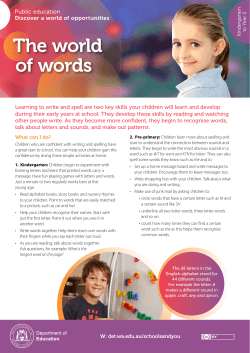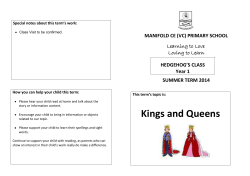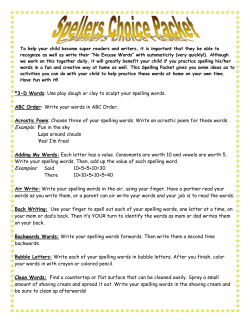
Spelling homework- how can I help?
Spelling homework- how can I help? I am frequently asked this question by concerned mothers who want to help their children with weekly spelling homework, but don’t know how. English spelling is challenging, as there are so many letter combinations, rules and exceptions to the rules. It is very helpful if your school uses a phonic system where spelling is taught according to the basic principle that letters representing the same sound are grouped together, as opposed to teaching individual phonic rules e.g. the following letter combinations all represent a long /e/ sound in words ‘ee’, ‘ea’, ‘e’, ‘ey’, ‘y’ Sound grouping is an extremely effective way of teaching phonics, as children are taught auditory strategies to identify sounds in words and choose which letter/letter combination represents the sound/s. At home, you can reinforce this principle by explaining that this week's spelling words all make the same sound e.g. /w/ and there are three common ways that you can write the /w/ sound in words i.e. ‘w’, ‘wh’, ‘u’ If you listen to these three words and ‘break up’ the words by sounding them out, you can hear the /w/ sound in each word. • when • wait • queen (this is the tricky one, as many children have been incorrectly taught that 'q' makes the /kw/ sound -but it is actually two sounds: /k/ and /w/. The letter 'q' makes the /k/ sound and the letter 'u' makes the /w/ sound) Make flashcards from the weekly list of spelling words and get your child to trace over the letters 'w’, ‘wh’ and ‘u' -so that they stand out clearly. wind quit when why quick Find three old shoe boxes, make a slit or hole in each box, that is big enough to slide the flashcard through, to represent a 'postbox'. Write the letters 'w', 'wh' and 'u' boldly on three small pieces of paper and stick them on each box. You will have a postbox for the 'w' words, 'wh' words and 'u' words. w wh u 2012© Phonix in a Box www.phonixinabox.co.za info@phonixinabox.co.za Read one word at a time on the flashcard, or take it in turns to read the cards if you have other children. Your child has to choose which postbox that word should be posted in i.e. the word 'where' will go into the 'wh' box because it has the letters 'wh' making the /w/ sound. If he/she gets it wrong, just show him/her the word so he/she can see the letters that have been traced over. You can explain that this word has the 'wh', instead of the 'w'. Put that card back into the pile, to try again later. This is a lovely, fun way to practice the words. You can reuse the 'postboxes' for the next week's spelling words, just change the letters on the top -to the sound being taught that week. It's important for your child to write the spelling words when he/she is learning them. You can make three columns on the page, with the three letter combinations in different colours as headings for each column. Practice writing the spelling words in colours e.g. all the 'wh' words in red, 'u' words in purple and 'w' words in blue. This will help to group them correctly and will help your child to remember them better. One more fun thing I love to do with children, is to make them spell the words out loud, by saying the letter names, as opposed to sounding out the words. If they make a mistake e.g. the word 'went' is spelt as 'whent'. Then we identify the "tricky letters' and say the letters (not the sounds) out loud again, but we say 'w' much louder than the other letters. This strategy is fun and kids love to shout out the letters that are the tricky ones to remember. When they write their spelling test, they will remember shouting out 'w' for that particular word. Learning spelling should be fun, not boring and negative. The more a child is exposed to words through engaging activities, the more they will retain and learn the correct way to spell the words. 2012© Phonix in a Box www.phonixinabox.co.za info@phonixinabox.co.za
© Copyright 2025





















